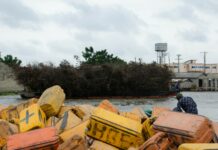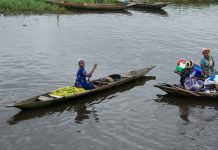Photo credit: DiasporaEngager (www.DiasporaEngager.com).
(Seychelles News Agency) – The United States National Oceanic and Atmospheric Administration (NOAA) has confirmed that uncharacteristically high ocean temperatures have triggered the fourth global mass coral bleaching event and Seychelles is already being affected.
Nirmal Shah, chief executive of Nature Seychelles, a non-profit organisation, said this event poses a significant threat to the ocean’s ecosystem and the millions of individuals who rely on reefs for sustenance, employment, and coastal security.
“The elevated ocean temperatures represent the result of the growing emissions of heat-trapping greenhouse gases (GHGs), such as carbon dioxide and methane, which have been increasingly trapped in the atmosphere. Consequently, the oceans have absorbed almost 90 percent of the excess heat, resulting in warmer waters,” Shah told SNA.
In March, the European Union’s Copernicus Climate Change Service (C3S) reported that the average sea surface temperature reached a record monthly high of 21.07 degrees Celsius.
“These developments are deeply concerning and require immediate attention from the international community to reduce GHG emissions and safeguard oceanic health,” said Shah
In Seychelles, coral bleaching was detected first at Aldabra in March and is now widespread around the granitic islands.
Shah elaborated that Nature Seychelles, which has been working on large coral restoration projects for almost 15 years, has had experimental shading mechanisms in the water for a few weeks now. The Coral Shading Initiative (CSI) is derived from indigenous knowledge in Seychelles by weaving palm leaves and putting them in bamboo frames.
He confirmed that preliminary results show promise and that the United Nations Development Programme (UNDP), which is funding Nature Seychelles‘ current reef restoration efforts, has agreed to provide $5,000 to expand this system.
“However, this is inadequate to save reefs. Seychelles needs massive national mobilisation like a war effort otherwise we will lose our reefs which supply food, sand for our beautiful beaches, barriers to storms and surges, and assets for dive tourism,” he added.
Shah, who expressed concern regarding Seychelles’ future, especially when facing extreme climate change, has recently been appointed to the Advisory Board of the Coral Restoration Consortium (CRC).
The CRC is a unique global community of practice composed of thousands of dedicated scientists and members of reef-rich communities, volunteer divers and local fishermen, climate change activists and government officials, university professors and leaders from the business world.
“The Advisory Board’s role is to listen actively to what the community needs, then advise how to create and share the products and resources they need to work more strategically and rapidly,” he said.
Source of original article: Seychelles News Agency (www.seychellesnewsagency.com).
The content of this article does not necessarily reflect the views or opinion of Global Diaspora News (www.GlobalDiasporaNews.com).
To submit your press release: (https://www.GlobalDiasporaNews.com/pr).
To advertise on Global Diaspora News: (www.GlobalDiasporaNews.com/ads).
Sign up to Global Diaspora News newsletter (https://www.GlobalDiasporaNews.com/newsletter/) to start receiving updates and opportunities directly in your email inbox for free.

































